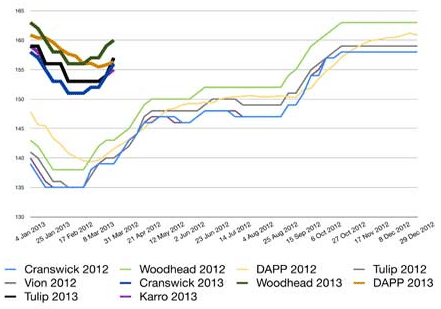



Shout Prices Rise But Easter Holiday Spooks Spot Buyers
UK - Tulip's decision to lift its shout price by 3p to reduce the gap between spot and contract was greeted with relief by pig sellers and was followed by Cranswick's move to lift its weekly price by 2p with all the others adding 1p, Peter Crichton writes.
The latest league table now reads as follows:
160p Woodhead (+1p)
157p Gills (+1p)
157p Tulip (+3p)
156p Cranswick (+2p)
155p Karro (+1p)
Spot buyers were, however, much more cautious and did not want to get caught with unsold stock in their fridges over the long four days upcoming Easter holiday, so their bids tended to be in the 156p-158p range, back by 2p on the previous week, and were only really buying on a hand to mouth basis.
The DAPP on the other hand continues to nudge ahead and put on another 50p to stand at 156.31p, but on balance average shout prices are now almost on a par with spot.
Although cull sow prices in Europe have remained at similar levels, a weakening in the value of the euro which traded on Friday at 85.3p reflecting the financial turmoil in Cyprus meant that cull sow quotes generally drifted down by 1p with most traded at around the 110p/kg mark on a delivered basis.
Weaner prices were also continuing with their steady upward progress with the latest AHDB 30kg ex-farm weaner average value at £47.74/head and as usual £2 to £4/head premiums available for Freedom Food weaners.
Demand in the cereals market remains virtually unchanged with March feed wheat quoted on LIFFE at £198.75/t and July at £203.00/t, but if northern European cereal growing conditions are as bad as they are in Britain there will be a significant shortage of feed wheat at harvest time, which may put further upward pressure on prices.
Straw will also be in short supply and because of the wet weather is also being used at an alarming rate. This is yet another reason why producers will need to be paid more money for their pigs to get back into the black and at least 170p/kg needs to be achieved in the months ahead to stem rising losses, which are even harder to bear during the testing weather conditions and the seemingly everlasting winter that producers have had to endure since our last so called summer.








